Director's Duty: Section 171 Companies Act 2006, Legal Analysis
VerifiedAdded on 2023/01/11
|5
|1303
|75
Report
AI Summary
This report critically discusses the duty of a company director to act within their powers, as defined by Section 171 of the Companies Act 2006. The report explains the importance of this duty, emphasizing that directors must make decisions according to the company's constitution and within the scope of their authorized roles. It highlights the consequences of directors exceeding their authority, citing the case of Re Smith and Fawcett, where decisions contrary to the Articles of Association led to penalties. The report also discusses the responsibility of directors to act only within the scope of their assigned duties, referencing Punt v Symons, where a director's involvement in unauthorized business activities was deemed a breach of contract. The conclusion reinforces the restrictions imposed on directors' decision-making and the potential for legal action if these restrictions are violated. References to relevant books and journals are included.
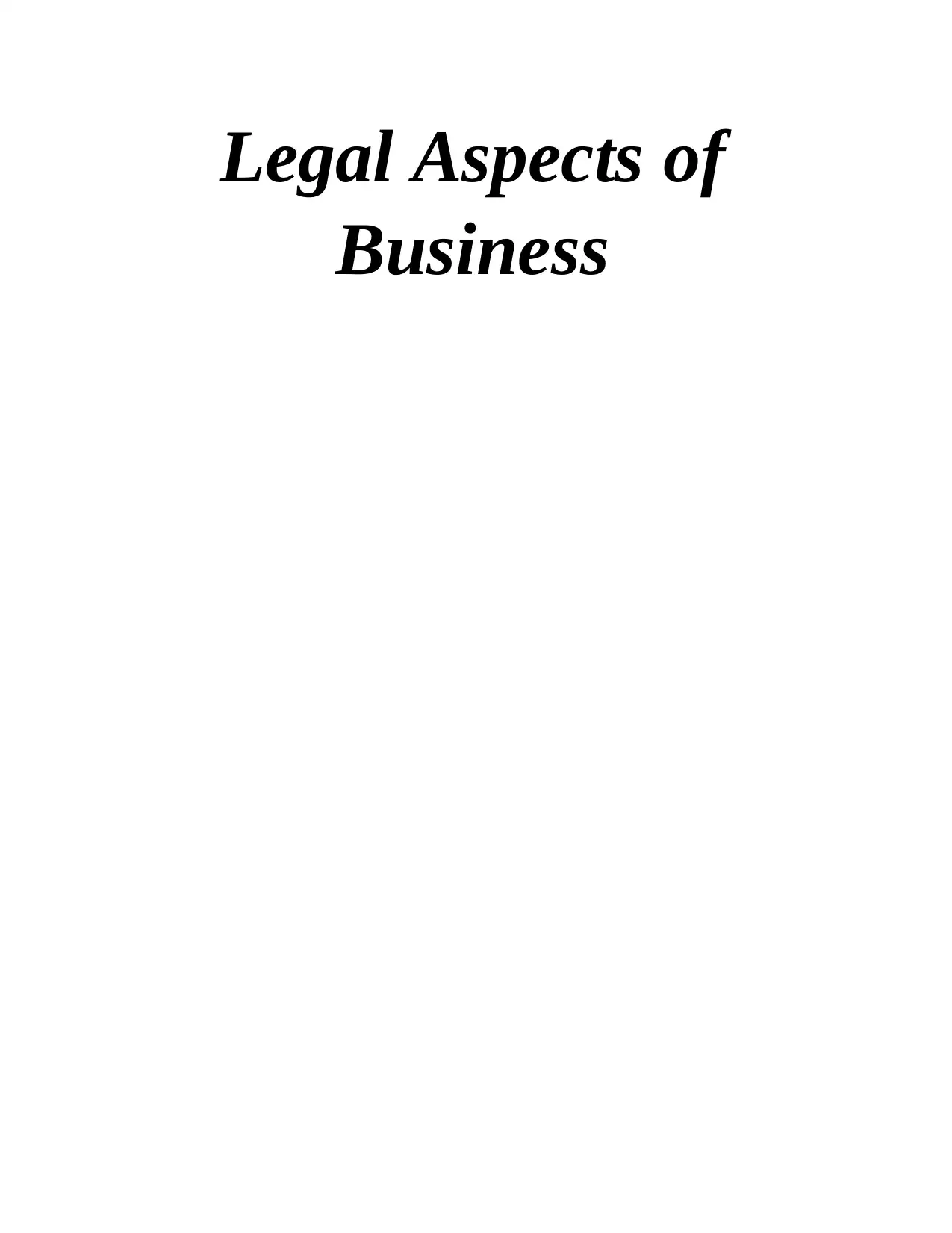
Legal Aspects of
Business
Business
Paraphrase This Document
Need a fresh take? Get an instant paraphrase of this document with our AI Paraphraser
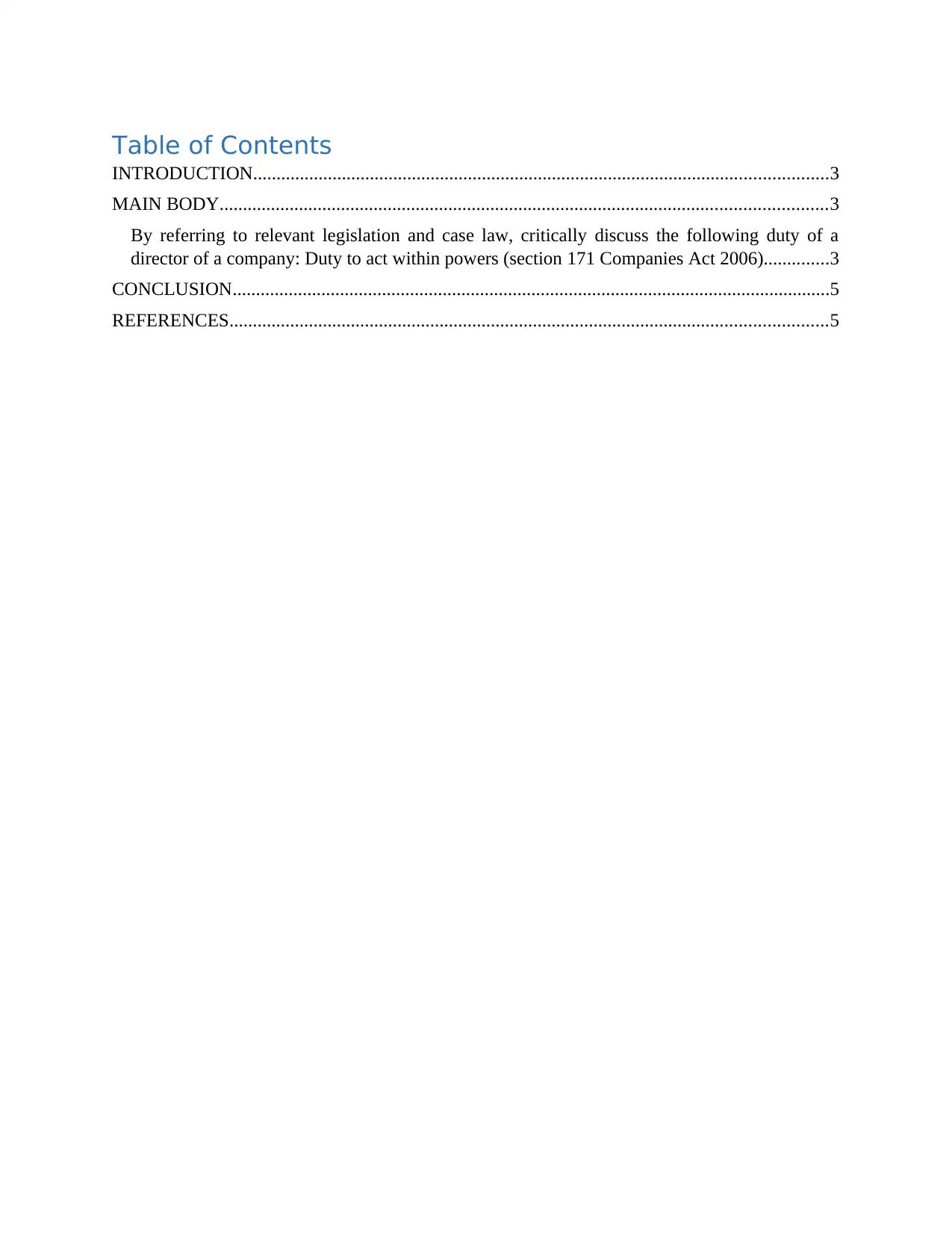
Table of Contents
INTRODUCTION...........................................................................................................................3
MAIN BODY..................................................................................................................................3
By referring to relevant legislation and case law, critically discuss the following duty of a
director of a company: Duty to act within powers (section 171 Companies Act 2006)..............3
CONCLUSION................................................................................................................................5
REFERENCES................................................................................................................................5
INTRODUCTION...........................................................................................................................3
MAIN BODY..................................................................................................................................3
By referring to relevant legislation and case law, critically discuss the following duty of a
director of a company: Duty to act within powers (section 171 Companies Act 2006)..............3
CONCLUSION................................................................................................................................5
REFERENCES................................................................................................................................5
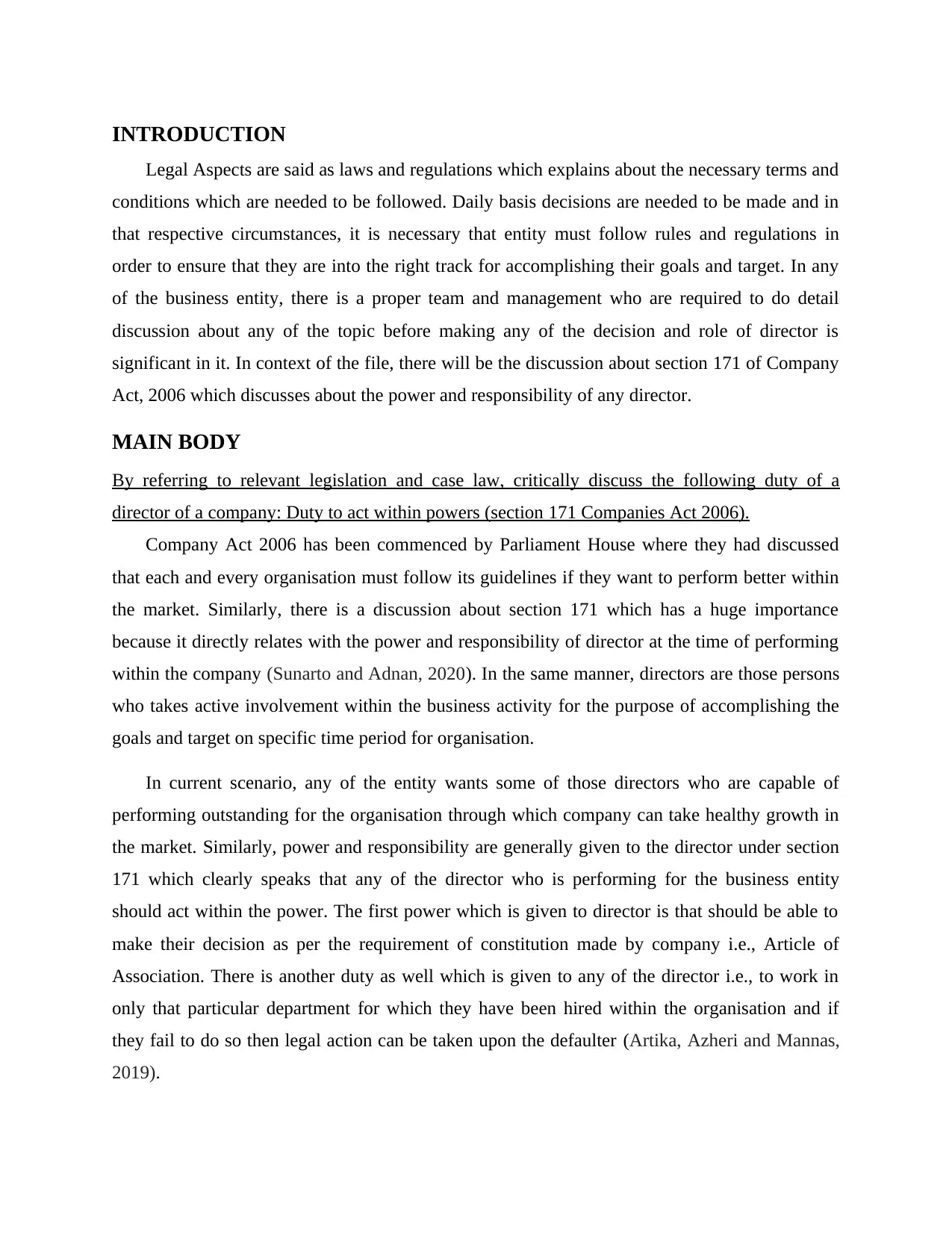
INTRODUCTION
Legal Aspects are said as laws and regulations which explains about the necessary terms and
conditions which are needed to be followed. Daily basis decisions are needed to be made and in
that respective circumstances, it is necessary that entity must follow rules and regulations in
order to ensure that they are into the right track for accomplishing their goals and target. In any
of the business entity, there is a proper team and management who are required to do detail
discussion about any of the topic before making any of the decision and role of director is
significant in it. In context of the file, there will be the discussion about section 171 of Company
Act, 2006 which discusses about the power and responsibility of any director.
MAIN BODY
By referring to relevant legislation and case law, critically discuss the following duty of a
director of a company: Duty to act within powers (section 171 Companies Act 2006).
Company Act 2006 has been commenced by Parliament House where they had discussed
that each and every organisation must follow its guidelines if they want to perform better within
the market. Similarly, there is a discussion about section 171 which has a huge importance
because it directly relates with the power and responsibility of director at the time of performing
within the company (Sunarto and Adnan, 2020). In the same manner, directors are those persons
who takes active involvement within the business activity for the purpose of accomplishing the
goals and target on specific time period for organisation.
In current scenario, any of the entity wants some of those directors who are capable of
performing outstanding for the organisation through which company can take healthy growth in
the market. Similarly, power and responsibility are generally given to the director under section
171 which clearly speaks that any of the director who is performing for the business entity
should act within the power. The first power which is given to director is that should be able to
make their decision as per the requirement of constitution made by company i.e., Article of
Association. There is another duty as well which is given to any of the director i.e., to work in
only that particular department for which they have been hired within the organisation and if
they fail to do so then legal action can be taken upon the defaulter (Artika, Azheri and Mannas,
2019).
Legal Aspects are said as laws and regulations which explains about the necessary terms and
conditions which are needed to be followed. Daily basis decisions are needed to be made and in
that respective circumstances, it is necessary that entity must follow rules and regulations in
order to ensure that they are into the right track for accomplishing their goals and target. In any
of the business entity, there is a proper team and management who are required to do detail
discussion about any of the topic before making any of the decision and role of director is
significant in it. In context of the file, there will be the discussion about section 171 of Company
Act, 2006 which discusses about the power and responsibility of any director.
MAIN BODY
By referring to relevant legislation and case law, critically discuss the following duty of a
director of a company: Duty to act within powers (section 171 Companies Act 2006).
Company Act 2006 has been commenced by Parliament House where they had discussed
that each and every organisation must follow its guidelines if they want to perform better within
the market. Similarly, there is a discussion about section 171 which has a huge importance
because it directly relates with the power and responsibility of director at the time of performing
within the company (Sunarto and Adnan, 2020). In the same manner, directors are those persons
who takes active involvement within the business activity for the purpose of accomplishing the
goals and target on specific time period for organisation.
In current scenario, any of the entity wants some of those directors who are capable of
performing outstanding for the organisation through which company can take healthy growth in
the market. Similarly, power and responsibility are generally given to the director under section
171 which clearly speaks that any of the director who is performing for the business entity
should act within the power. The first power which is given to director is that should be able to
make their decision as per the requirement of constitution made by company i.e., Article of
Association. There is another duty as well which is given to any of the director i.e., to work in
only that particular department for which they have been hired within the organisation and if
they fail to do so then legal action can be taken upon the defaulter (Artika, Azheri and Mannas,
2019).
⊘ This is a preview!⊘
Do you want full access?
Subscribe today to unlock all pages.

Trusted by 1+ million students worldwide
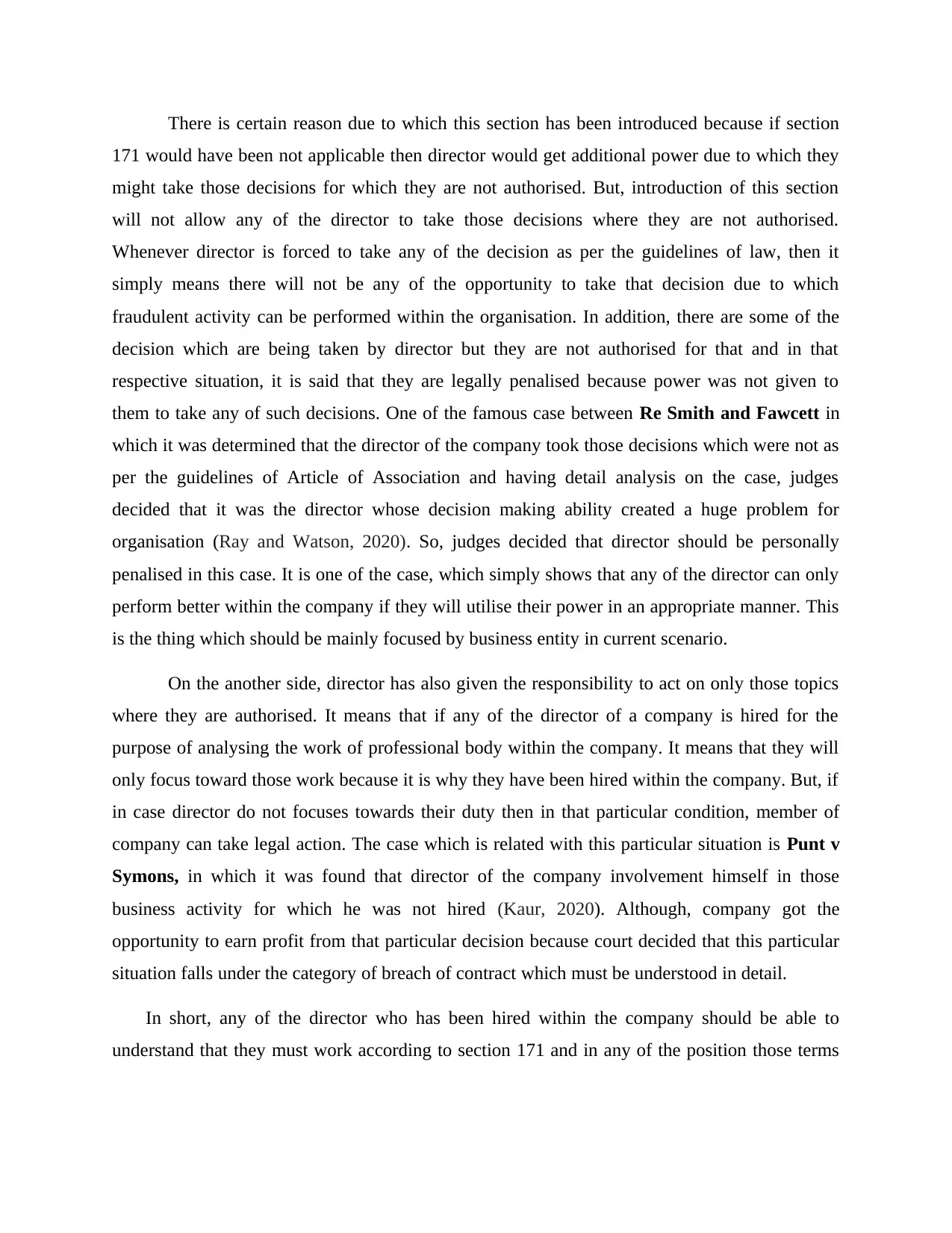
There is certain reason due to which this section has been introduced because if section
171 would have been not applicable then director would get additional power due to which they
might take those decisions for which they are not authorised. But, introduction of this section
will not allow any of the director to take those decisions where they are not authorised.
Whenever director is forced to take any of the decision as per the guidelines of law, then it
simply means there will not be any of the opportunity to take that decision due to which
fraudulent activity can be performed within the organisation. In addition, there are some of the
decision which are being taken by director but they are not authorised for that and in that
respective situation, it is said that they are legally penalised because power was not given to
them to take any of such decisions. One of the famous case between Re Smith and Fawcett in
which it was determined that the director of the company took those decisions which were not as
per the guidelines of Article of Association and having detail analysis on the case, judges
decided that it was the director whose decision making ability created a huge problem for
organisation (Ray and Watson, 2020). So, judges decided that director should be personally
penalised in this case. It is one of the case, which simply shows that any of the director can only
perform better within the company if they will utilise their power in an appropriate manner. This
is the thing which should be mainly focused by business entity in current scenario.
On the another side, director has also given the responsibility to act on only those topics
where they are authorised. It means that if any of the director of a company is hired for the
purpose of analysing the work of professional body within the company. It means that they will
only focus toward those work because it is why they have been hired within the company. But, if
in case director do not focuses towards their duty then in that particular condition, member of
company can take legal action. The case which is related with this particular situation is Punt v
Symons, in which it was found that director of the company involvement himself in those
business activity for which he was not hired (Kaur, 2020). Although, company got the
opportunity to earn profit from that particular decision because court decided that this particular
situation falls under the category of breach of contract which must be understood in detail.
In short, any of the director who has been hired within the company should be able to
understand that they must work according to section 171 and in any of the position those terms
171 would have been not applicable then director would get additional power due to which they
might take those decisions for which they are not authorised. But, introduction of this section
will not allow any of the director to take those decisions where they are not authorised.
Whenever director is forced to take any of the decision as per the guidelines of law, then it
simply means there will not be any of the opportunity to take that decision due to which
fraudulent activity can be performed within the organisation. In addition, there are some of the
decision which are being taken by director but they are not authorised for that and in that
respective situation, it is said that they are legally penalised because power was not given to
them to take any of such decisions. One of the famous case between Re Smith and Fawcett in
which it was determined that the director of the company took those decisions which were not as
per the guidelines of Article of Association and having detail analysis on the case, judges
decided that it was the director whose decision making ability created a huge problem for
organisation (Ray and Watson, 2020). So, judges decided that director should be personally
penalised in this case. It is one of the case, which simply shows that any of the director can only
perform better within the company if they will utilise their power in an appropriate manner. This
is the thing which should be mainly focused by business entity in current scenario.
On the another side, director has also given the responsibility to act on only those topics
where they are authorised. It means that if any of the director of a company is hired for the
purpose of analysing the work of professional body within the company. It means that they will
only focus toward those work because it is why they have been hired within the company. But, if
in case director do not focuses towards their duty then in that particular condition, member of
company can take legal action. The case which is related with this particular situation is Punt v
Symons, in which it was found that director of the company involvement himself in those
business activity for which he was not hired (Kaur, 2020). Although, company got the
opportunity to earn profit from that particular decision because court decided that this particular
situation falls under the category of breach of contract which must be understood in detail.
In short, any of the director who has been hired within the company should be able to
understand that they must work according to section 171 and in any of the position those terms
Paraphrase This Document
Need a fresh take? Get an instant paraphrase of this document with our AI Paraphraser
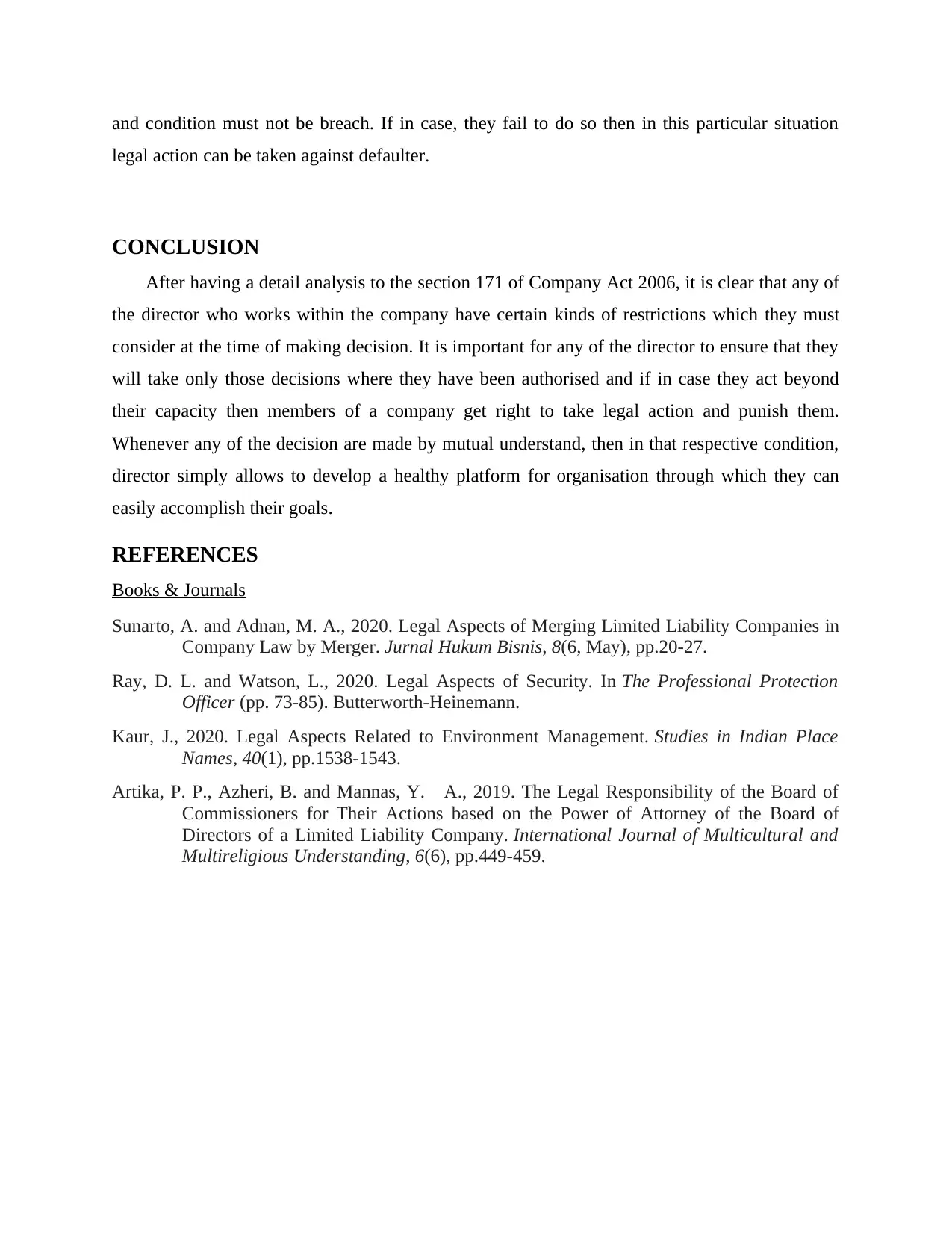
and condition must not be breach. If in case, they fail to do so then in this particular situation
legal action can be taken against defaulter.
CONCLUSION
After having a detail analysis to the section 171 of Company Act 2006, it is clear that any of
the director who works within the company have certain kinds of restrictions which they must
consider at the time of making decision. It is important for any of the director to ensure that they
will take only those decisions where they have been authorised and if in case they act beyond
their capacity then members of a company get right to take legal action and punish them.
Whenever any of the decision are made by mutual understand, then in that respective condition,
director simply allows to develop a healthy platform for organisation through which they can
easily accomplish their goals.
REFERENCES
Books & Journals
Sunarto, A. and Adnan, M. A., 2020. Legal Aspects of Merging Limited Liability Companies in
Company Law by Merger. Jurnal Hukum Bisnis, 8(6, May), pp.20-27.
Ray, D. L. and Watson, L., 2020. Legal Aspects of Security. In The Professional Protection
Officer (pp. 73-85). Butterworth-Heinemann.
Kaur, J., 2020. Legal Aspects Related to Environment Management. Studies in Indian Place
Names, 40(1), pp.1538-1543.
Artika, P. P., Azheri, B. and Mannas, Y. A., 2019. The Legal Responsibility of the Board of
Commissioners for Their Actions based on the Power of Attorney of the Board of
Directors of a Limited Liability Company. International Journal of Multicultural and
Multireligious Understanding, 6(6), pp.449-459.
legal action can be taken against defaulter.
CONCLUSION
After having a detail analysis to the section 171 of Company Act 2006, it is clear that any of
the director who works within the company have certain kinds of restrictions which they must
consider at the time of making decision. It is important for any of the director to ensure that they
will take only those decisions where they have been authorised and if in case they act beyond
their capacity then members of a company get right to take legal action and punish them.
Whenever any of the decision are made by mutual understand, then in that respective condition,
director simply allows to develop a healthy platform for organisation through which they can
easily accomplish their goals.
REFERENCES
Books & Journals
Sunarto, A. and Adnan, M. A., 2020. Legal Aspects of Merging Limited Liability Companies in
Company Law by Merger. Jurnal Hukum Bisnis, 8(6, May), pp.20-27.
Ray, D. L. and Watson, L., 2020. Legal Aspects of Security. In The Professional Protection
Officer (pp. 73-85). Butterworth-Heinemann.
Kaur, J., 2020. Legal Aspects Related to Environment Management. Studies in Indian Place
Names, 40(1), pp.1538-1543.
Artika, P. P., Azheri, B. and Mannas, Y. A., 2019. The Legal Responsibility of the Board of
Commissioners for Their Actions based on the Power of Attorney of the Board of
Directors of a Limited Liability Company. International Journal of Multicultural and
Multireligious Understanding, 6(6), pp.449-459.
1 out of 5
Related Documents
Your All-in-One AI-Powered Toolkit for Academic Success.
+13062052269
info@desklib.com
Available 24*7 on WhatsApp / Email
![[object Object]](/_next/static/media/star-bottom.7253800d.svg)
Unlock your academic potential
Copyright © 2020–2025 A2Z Services. All Rights Reserved. Developed and managed by ZUCOL.





